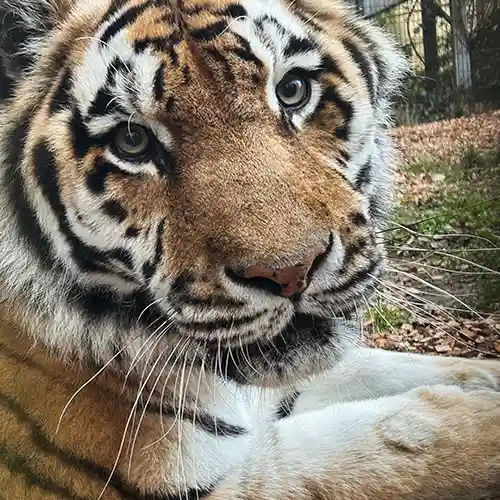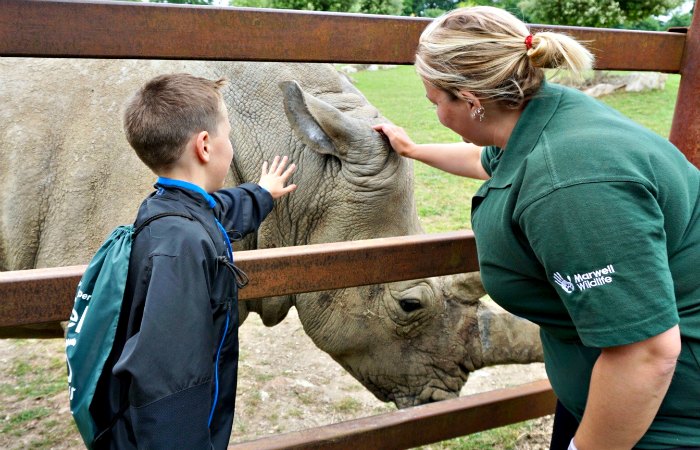견적문의
페이지 정보
작성자 Jamison 댓글댓글 0건 조회조회 97회 작성일작성일 25-03-16 12:55본문
| 회사명 | LI |
|---|---|
| 담당자명 | Jamison |
| 전화번호 | AU |
| 휴대전화 | OJ |
| 이메일 | jamisongatenby@bigpond.com |
| 프로젝트유형 | |
|---|---|
| 제작유형 | |
| 제작예산 | |
| 현재사이트 | |
| 참고사이트1 | |
| 참고사이트2 |

"The greatness of a country and its ethical development can be judged by the way its animals are treated." - Mahatma Gandhi

Do you love animals and dream of operating in a zoo? Zoo keepers are key in protecting wildlife and caring for animals. At locations like the Zoological Society of London (ZSL), over 20,000 animals get the care they require from specialists.
To become a zoo keeper, you need effort, education, and a love for animals. This job is amazing, letting you deal with lots of types and aid with crucial preservation work. If you're into wildlife or animal welfare, zookeeping might be perfect for you.
Beginning your zoo keeper career means discovering what's needed. This guide will cover education, experience, and more. It's all you require to know to start a satisfying zookeeping career.
Comprehending the Role of a Zookeeper
Exploring what a zookeeper does reveals a function loaded with difficulties and benefits. They focus on animal welfare and conservation. Zookeepers work hard to keep animals healthy and happy in their care.
Daily Responsibilities and Tasks
A zookeeper's day is filled with essential jobs:
- Preparing meals that satisfy each animal's dietary requirements
- Cleaning enclosures to keep them clean and safe
- Monitoring animal health and zookeeper behaviour
- Offering medicines and treatments as required
- Developing activities to keep animals psychologically sharp
Workplace and Conditions
Zookeepers work outside in all sort of weather. They handle both indoor and outdoor areas. The task requires being physically fit and able to deal with the needs of taking care of animals.
"Being a zookeeper is more than a task - it's an enthusiastic dedication to animal care and conservation."
Kinds of Animals and Specialisations
Zookeepers can specialise in many animal groups:
- Primates
- Big cats
- Marine mammals
- Reptiles
- Birds
Your role may involve dealing with 2-5 various animal species. This needs a lot of understanding and the ability to adapt.
Necessary Skills and Personal Qualities for Zoo Keeping
To be a top zookeeper, you require more than simply a love for animals. Your task will be difficult and need you to manage animals and individuals well. You'll likewise require to comprehend animal behaviour.
What zoos try to find in people includes:
- Exceptional perseverance and zookeeper emotional durability
- Strong physical conditioning and endurance
- Eager observation skills
- Capability to remain calm under pressure
- High level of empathy towards animals
Getting hands-on experience is essential to mastering this function. You'll require to show:
- Advanced understanding of animal care techniques
- Efficiency in animal handling and safety protocols
- Reliable communication with both animals and human visitors
"A fantastic zookeeper connects science, compassion, and conservation in every interaction with animals."
You need to know about animal nutrition, behaviour, and zookeeper standard veterinarian care. A lot of zookeepers learn through training, volunteering, and continuous knowing.
Zookeeper work is not simply a task. It's a big commitment to teaching about wildlife and assisting preservation. Your passion and effort will make you stand apart in this fulfilling career.
How to Become a Zoo Keeper
Beginning a profession as a zookeeper requires mindful preparation and education. You need to initially comprehend the instructional needs and training courses. These will turn your love for animals into a task.
Educational Requirements
To be a fantastic zookeeper, you need a strong academic base. A lot of jobs search for particular certifications:
- At least 5 GCSEs at grade 4 or above, consisting of English, mathematics, and science
- A levels or college credentials
- A college degree in biology or animal science
- Level 3 Diploma in Animal Management
Required Certifications
Getting special certifications can truly help you in your zookeeper profession. Essential ones consist of:
- Diploma in Management of Zoo and Aquarium Animals (DMZAA)
- Zookeeping Level 3 Diploma (RQF)
- Animal managing certificates
- Emergency treatment credentials
Training Programs and Apprenticeships
Getting hands-on experience is type in zookeeper training. Lots of places provide fantastic opportunities:
- Unpaid apprenticeships at wildlife parks
- Internship programs at popular zoos
- Practical training at places like Colchester Zoo and Dartmoor Zoo
- Offering to gain real-world skills
Pro tip: Create a detailed portfolio to show your animal care abilities. It will help you in task applications.
Building Relevant Experience in Animal Care
Gaining hands-on is key for those wanting to be zookeepers. The task is very competitive. So, it's essential to start constructing a strong base in animal care.
Your journey begins with finding methods to work directly with animals. This is a tactical action.
"Experience is the best instructor in animal care" - Wildlife Conservation Experts
Here are effective ways to gain experience working with animals:
- Volunteer at local animal shelters to establish standard animal handling skills
- Seek internships at wildlife rehabilitation centres
- Explore part-time positions at veterinary centers
- Contact your local zoo for possible volunteer opportunities
Volunteering is an excellent way to learn more about animal behaviour and care. Many zoos and animal shelters are searching for individuals who want to learn. These places provide excellent possibilities to get hands-on experience and show your commitment to animal welfare.
Here are some pointers to make the most of your experience:
- Keep a record of your skills and interactions
- Get in touch with specialists in animal care
- Request for references and letters of recommendation
- Stay consistent and show your real enthusiasm
Keep in mind, practical experience makes you stick out in the zookeeping world. Each time you deal with animals, you find out more. This increases your chances of getting a job in animal care.
Profession Pathways and Professional Development
Starting a profession as a zookeeper is interesting. It provides numerous chances to grow and specialise. Your journey starts with comprehending the different courses in this field.
Entry-Level Positions
Entry-level jobs in zookeeping are a fantastic start. They give you hands-on experience. Zoos look for zookeeper prospects with:
- Level 2 Diploma in Animal Care (minimum certification)
- GCSEs in English and a clinical topic
- Volunteer experience at animal shelters or farms
Profession Progression Opportunities
As you gain experience, your career can grow. You can go up to:
- Junior Keeper
- Senior Keeper
- Group Leader
- Specialist Roles
"Continuous knowing and practical experience are key to advancing in your zookeeping profession."
Specialised Roles
You can also pick unique areas like:

- Conservation reproducing programmes
- Animal training
- Wildlife research
- Educational outreach
About 25% of zookeepers get advanced degrees in zoology or animal preservation. Getting Level 4 qualifications can boost your chances for senior roles and research.
Working Hours and Physical Demands
Ending up being a zookeeper suggests you'll work more than simply routine hours. You'll deal with hard physical difficulties and need to be versatile, consisting of weekends and holidays. Zoos are open every day, so you'll frequently work when others unwind.
"Zoo keeping is not a typical 9-to-5 task-- it's a lifestyle of devoted animal care and commitment."
This task is physically demanding. You'll work outside in any weather, raising heavy items over 50 pounds. Your jobs might include:
- Early early morning feeding schedules
- Cleaning up animal enclosures
- Preparing specialised diets
- Conducting health checks
- Preserving intricate habitats
Shifts can begin as early as 5 AM and go late into the night. You'll be on your feet the majority of the time, moving between animal zones. Weekends and holidays are part of the job, requiring lots of endurance and commitment.
Regardless of the difficulties, this job has terrific benefits. You'll grow strong, both physically and mentally. You'll also make incredible connections with amazing animals.
Health and Safety Considerations
Being a zookeeper features its own set of challenges. It's crucial to understand how to keep both animals and staff safe. This means following stringent health and safety rules.
Zookeepers face a special environment where security is essential. Studies reveal that health and wellness are now as crucial as the zoo's main work.
Danger Management Strategies
There are numerous methods to handle threats in zoos:
- Daily checks of animal enclosures for threats
- Counting animals at the start and end of shifts
- Watching how visitors act near animals
- Being ready for emergencies
Animal Handling Safety Protocols
Knowing which animals are most hazardous is vital. Huge animals like rhinos can be extremely risky. There have been cases where zookeepers got seriously harmed.
Safety isn't almost wearing gear - it's about knowing animal behaviour and staying alert.
Individual Protective Equipment
Zookeepers require to use the ideal gear, consisting of:
- Special gloves for managing animals
- Strong shoes for grip and safety
- Clothing that protects against bacteria
Getting vaccinated against illness like hepatitis B and rabies is likewise crucial. It helps keep zookeepers healthy in their tough job.
Wage Expectations and Job Market
Thinking of a profession in zoo keeping? It's essential to learn about wages and the job market. The field is growing, with more opportunities in the UK.
Let's look at what zoo keepers can earn at various phases:
- Entry-level zookeepers begin at about ₤ 14,000 a year
- Certified ones make between ₤ 16,000 and ₤ 22,000
- Senior zookeepers can earn approximately ₤ 30,000 or more
The task outlook for zoo keepers is great. The sector is expected to grow by 5% in the UK by 2029. This suggests around 3,910 brand-new jobs will be readily available.
"The Association of Zoos and Aquariums supports expert growth for zoo keepers," a report states.
Salaries vary based on a number of things:
- Experience level
- Expertise
- Where you work
- The zoo's size and type
While the pay may not be high, the pleasure of working with animals is invaluable. The typical salary is around ₤ 17,000. But, overall earnings can be between ₤ 13,000 and ₤ 27,000 a year.
Conclusion
Starting a career in animal care is an interesting journey. It needs devotion, passion, and a love for knowing. With over 350 zoos and wildlife locations in the UK, there are numerous task chances. You'll get to deal with remarkable animals and assist protect wildlife.
To be a zoo keeper, you require more than simply love for animals. You need to have a good understanding of biology, have the ability to interact well, and always wish to find out more. You'll gain hands-on experience, discover animal welfare, and develop a deep regard for nature. About 3,000 people in the UK have found satisfying professions in this field.
Your success in zoo keeping comes from mixing science with a love for animals. Whether you're interested in mammals, birds, or marine life, this task lets you help with conservation. Every day will bring brand-new obstacles and discovering chances that will enhance your skills and knowledge.
If you like animals and want to assist secure wildlife, zoo keeping might be for zookeeper you. Handle the challenge, stay curious, and turn your enthusiasm for animals into a rewarding profession.

